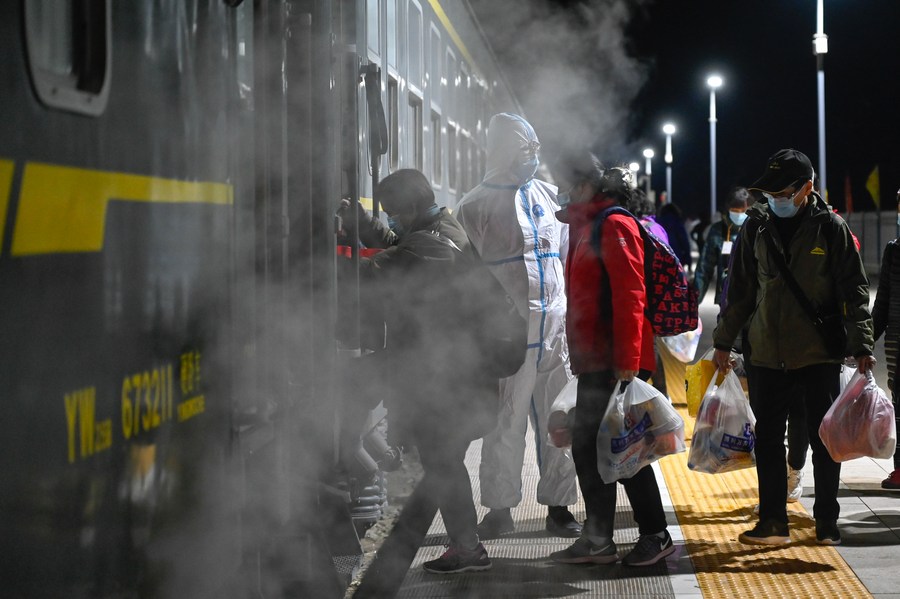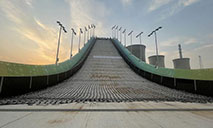Targeted containment aims to curb COVID-19 while minimizing impact
-- Local governments are leaving no stone unturned to curb infections while minimizing the impact on people's lives and production.
-- Anti-epidemic measures such as mass nucleic acid testing, epidemiological investigations, origin tracing, targeted screening and quarantines, adjustment of medium and high-risk area classifications, have been immediately adopted to curb transmissions.
-- A slew of policies and measures have been rolled out to help mitigate the impact of local flare-ups since a COVID-19 outbreak over summer affected dozens of cities.
BEIJING, Nov. 3 (Xinhua) -- Shanghai Disneyland and Disneytown reopened Wednesday, just two days after a temporary closure for epidemic prevention and control works.

A staff member dressed as LinaBell waves to visitors at Shanghai Disney Resort, which has reopened after a temporary closure for epidemic prevention and control work, in east China's Shanghai, Nov. 3, 2021. (Xinhua)
On the evening of Oct. 31, Disneyland issued a statement saying entry has been suspended to cooperate with COVID-19 epidemiological investigation in other provinces and cities. The notice asked guests to undergo nucleic acid testing at the exit when leaving the resort.
"I spent a memorable Halloween at the resort along with tens of thousands of visitors," said a visitor surnamed Li who celebrated her birthday at the park with her boyfriend. "Fireworks dazzled the sky as we completed our testing, while healthcare workers were busy conducting our tests effectively," she recalled.
A total of 66,460 tests were conducted and all results came out negative as of 8 a.m. Tuesday, in the two rounds of COVID-19 screening within 48 hours, including all cast members and third-party employees and tourists who had visited the facility during the weekend, according to a notice issued by Shanghai's epidemic control headquarters on Tuesday.
The efficient response by Shanghai Disneyland resort mirrored the determined efforts across the country in the face of sporadic cluster infections. Meanwhile, local governments are leaving no stone unturned to curb infections while minimizing the impact on people's lives and production.
TARGETED ANTI-EPIDEMIC MEASURES
The Chinese mainland reported a total of 93 locally transmitted COVID-19 cases on Tuesday, according to the national health commission.
Anti-epidemic measures such as mass nucleic acid testing, epidemiological investigations, origin tracing, targeted screening and quarantines, adjustment of medium and high-risk area classifications, have been immediately adopted to curb transmissions.

Aerial photo taken on Oct. 27, 2021 shows residents waiting in lines for COVID-19 nucleic acid testing at a sampling site in Yinchuan, northwest China's Ningxia Hui Autonomous Region. (Xinhua/Feng Kaihua)
Northwest China's Ningxia Hui Autonomous Region has enforced closed-off management in over 5,000 buildings and apartments, along with home quarantine and close health monitoring measures.
In order to eradicate the hospital-acquired infection, the designated People's Hospital of Ningxia has put all patients under closed-loop management and provided them with exclusive transportation to avoid cross-infection.
"If a patient is seriously ill and needs to be hospitalized, doctors will divert him or her to different wards accordingly for classified management," said Ma Feng, director of the joint prevention and control office of the hospital. More hospitals in Ningxia have been mobilized to follow suit.
In a neighborhood in Beijing's Haidian District, Chen Yumei, a resident, said that community workers worked very hard around the clock during the closed-off management of the neighborhood that was lifted Wednesday morning.
Their daily necessities were guaranteed every day through doorstep delivery and the people benefited from the local government's efforts to ensure stable prices and an adequate supply of daily necessities, Chen said.

A staff member sorts out delivery packages at Furongli residential community, which has been put under quarantine amid a recent COVID-19 outbreak, in Haidian District in Beijing, capital of China, Oct. 27, 2021. (Xinhua/Ren Chao)
Provinces and regions in northwest China saw a recent resurgence of the epidemic at a number of popular tourist sites. Over 9,000 tourists who were stranded in the Ejina Banner of the Inner Mongolia Autonomous Region have been orderly transported to their homes since Oct. 27.
The local government came up with diversified transport plans for different tourists, including individual tourists as well as those who traveled by coaches, trains, or drove to the tourist sites.

Tourists stranded due to a COVID-19 outbreak get on a train at Ejina Railway Station in Ejina Banner of Alxa League, north China's Inner Mongolia Autonomous Region, Oct. 27, 2021. (Xinhua/He Shuchen)
A hotel for medical observation in Erdos offers masks, hand sanitizers and fresh fruits to such tourists. It also provides wheelchairs, common medicine and first aid for the elderly people who need them.
FACILITATING PRODUCTION, BUSINESS OPERATION
A slew of policies and measures have been rolled out to help mitigate the impact of local flare-ups since a COVID-19 outbreak over summer affected dozens of cities including Nanjing and Yangzhou in east China's Jiangsu Province.
The provincial government of Jiangsu released a document in September, aiming to aid local enterprises in resuming normal operations, which included widely acclaimed tax cuts, finance support, and insurance reduction.
All major provincial and municipal projects in epidemic-hit areas had resumed work as of the end of October this year, and Jiangsu's foreign trade imports and exports increased by 17.1 percent year on year from January to August, according to the Jiangsu Provincial Development and Reform Commission.

A ship loaded with cargoes leaves a container terminal in Lianyungang, east China's Jiangsu Province, July 13, 2021. (Photo by Wang Jianmin/Xinhua)
"Wearing face masks, regular disinfection and vaccination are the consensus here, so as to protect ourselves from the epidemic," said Fu Yujiao, one of the employees with Wuxi Murata Electronics Co. Ltd., a Japanese company based in Jiangsu's Wuxi New District.
Nishikohri Takumi, general manager of the company, said that with the help of the local government in offering on-site vaccination service, they are confident in advancing production and operation. The company's sales revenue from January to September this year climbed 22 percent year on year.
Nucleic acid testing services are provided around the clock to enhance the testing capacity and efficiency for factories and companies to ensure smooth operation.
Shanghai will host the fourth China International Import Expo (CIIE) from Nov. 5 to 10. Despite the COVID-19 pandemic, global exhibitors have shown greater interest and confidence in seizing new opportunities in the Chinese market.

Workers build a pavilion at the National Exhibition and Convention Center (Shanghai), a main venue for the fourth China International Import Expo (CIIE), in east China's Shanghai, Oct. 29, 2021. (Xinhua/Fang Zhe)
Rajat Agarwal, president of Henkel Greater China, an exhibitor of the expo for three years, said Shanghai has quickly and effectively implemented sound disease prevention and control measures. The city rolled out a well-organized vaccination program that included foreign residents.
"Henkel is eagerly looking forward to participating once again in the CIIE and having the opportunity to engage more closely with consumers and partners in China at this flagship event," Agarwal said.
The epidemic has also made manufacturing firms accelerate the digitalization process. Jingyi Group, a textile company in Jiangsu's Suzhou City, has developed intelligent manufacturing technologies to reduce human labor.
"Faced with impacts like rising raw material prices and labor costs, we have stepped up digital transformation and our sales have seen robust growth this year," said Chen Lu, general manager of Jingyi Group.
Photos
Related Stories
- U.S. prisons face worsening staff shortages amid COVID-19: news agency
- Chinese mainland reports 93 locally transmitted COVID-19 cases
- Shanghai has administered 365,500 COVID-19 vaccine doses to minors aged 6 to 11
- COVID-19 nucleic acid test held in China's Hebei
- Children aged 3 to 11 receive COVID-19 vaccination in China's Hefei
Copyright © 2021 People's Daily Online. All Rights Reserved.










